It's a record breaker
Greetings!
It is hard
sometimes not to become jaded by records. We are assailed on every side by the
biggest or the best in one form or another. A certain degree of superlative
fatigue sets in; that's as true for angling as for many spheres of life.
|
|
|
|
|
Simon Ellis with his 4lb
8oz new British record grayling
|
I think long ago most of us
dismissed the freshwater records for most pond raised fish as, well,
artificial. Now I take my hat off to
those who have the dedication and skill to nurture these leviathans but are
they really records in the spirit of record taking? I tend to think not. Then
there is the thorny question of river caught fish. When does a stocked fish
stop being stocked transmogrifying into a wild fish? One week? One month? One
season? I truly don't know.
The growing of record fish
had become so much of an arms race that the British Record Fish Committee
closed the lists for all five of what they term 'cultivated game fish' in 2015.
You could argue that that is a bit of a shame but on the other hand it does
mean that any new native fish record has to be something truly stupendous.
The bars you have to raise
date back nearly a century; the Atlantic salmon record was caught in 1922. At
64lb you do wonder if that will be ever broken as with the 28lb Sea trout from
1998. It is classified as a River Test capture but to my mind Calshot Spit is
essentially the English Channel. As for the 31lb Brown trout from Loch Awe in
2002, well the mind boggles quite frankly. It even tops the 'cultivated'
monster of 28lbs from Dever Springs. Which leaves us with Paul Mildren's 4lb
4oz grayling from the River Frome in Dorset in 2009 which beat the previous
record by an ounce, also from the Frome sixteen years earlier. If you want a
British game record a grayling would looks to me to be your best bet. As it
turns out that just happens to be true.
|
|
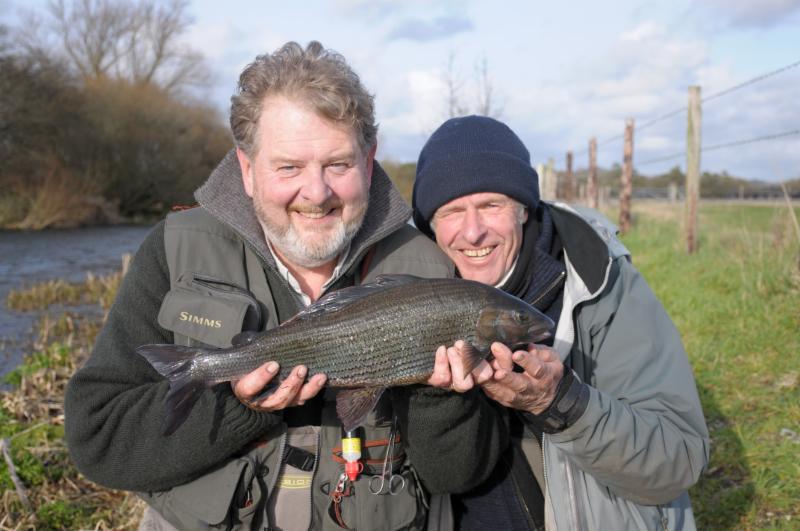 |
|
|
Simon with John Bailey who
is doing a passable imitation of the worlds happiest leprechaun
|
I am not great pursuer of
records but I do get a little excited by the grayling record. This is probably
more to do with proximity than ability. I regularly fish the Frome where the
record fish were caught and have come within 15% of the record. That does make
me sound a little obsessive but think about getting within fifteen percent of
Miss Ballantine's fish - that would be a 55lb salmon. Do the maths on the other
records to sort might see where I am going? And the Frome is historically the
big grayling Valhalla, the original stock imported by the Victorians from the
Derbyshire Dove to thrive in this food rich river; most chalkstreams were
stocked with grayling at some point or another, only the Hampshire Avon having
a true 'native' population.
Where is all this leading?
Well, to a new British record that was caught by Simon Ellis at Ilsington on
the River Frome on February 19th. And it wasn't just a nudge over
the record. It was in the words of John Bailey writing the tale of the capture
up for the Anglers Mail 'smashed'. At 4lbs 8oz it's a monster. The biggest
grayling ever recorded. John actually has to take some of the credit as he was
guiding a small group that day, putting Simon on the particular pool choosing a
weighted pink nymph below a strike indicator. Yes, this is not just a record
grayling but a record grayling caught on the fly.
So, well done to everyone
involved. It's a distinctive fish with that damaged dorsal fin so if it comes
out again there will be no problem identifying it. That said we are not sure
how old it is. The literature on the length of a grayling's life is vague. Five
years seems to be a norm with eight possible. Does anyone know? Anyway John and
Simon will be putting in their application to the British Record Fish
Committee. It is a thorough process that takes some time but however long it
takes I suspect Simon and John will still be glowing with well-deserved pride.
As for the fish well, after
some tender care he (or maybe she) swam off back into the deep. I might just be
in the front of the queue when the new grayling season opens .....
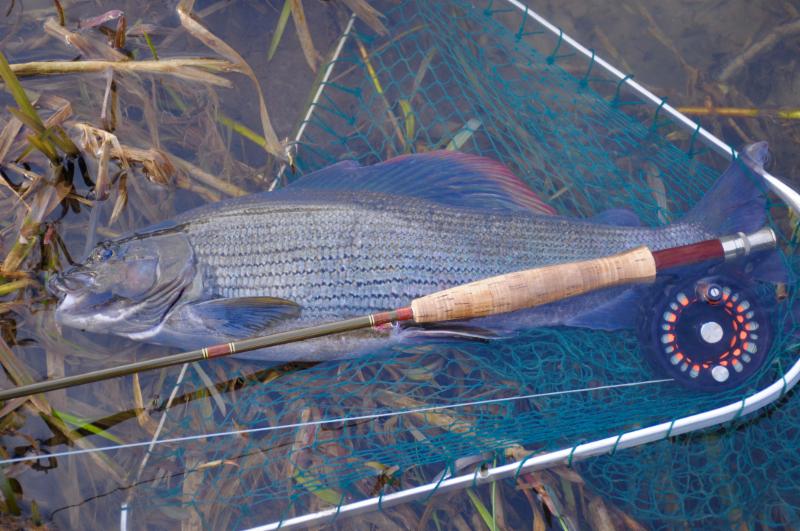
Summer
beauty
It is
entirely serendipitous but no sooner did I write about the River Meon last time
around but then this east Hampshire stream appeared on the front cover of the
April edition
of Trout
& Salmon magazine.
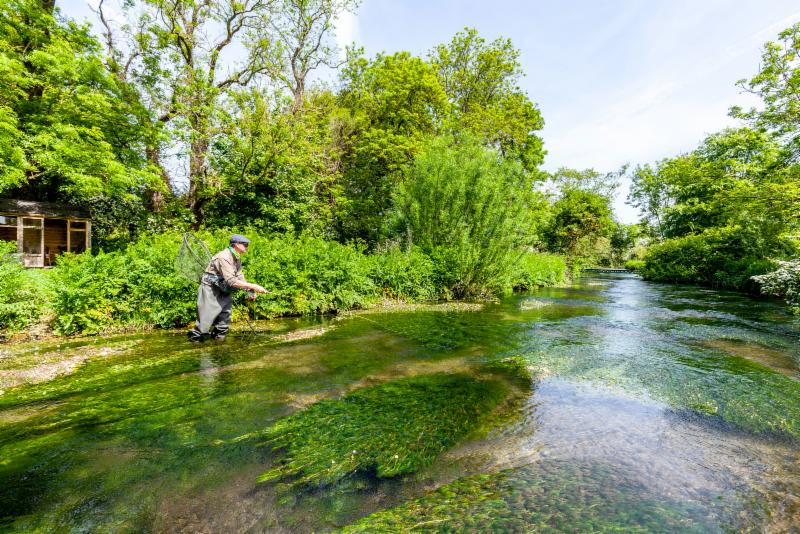 The article on our very own
Exton Manor Farm beat was written by Chris McCully and beautifully photographed
by Richard Faulks when they visited in June of last year.
The article on our very own
Exton Manor Farm beat was written by Chris McCully and beautifully photographed
by Richard Faulks when they visited in June of last year.
As you can see it is the
very epitome of an English chalkstream summer.
I'm very grateful to Trout
& Salmon for allowing us to reproduce the photographs here.
Roll on the new season ....
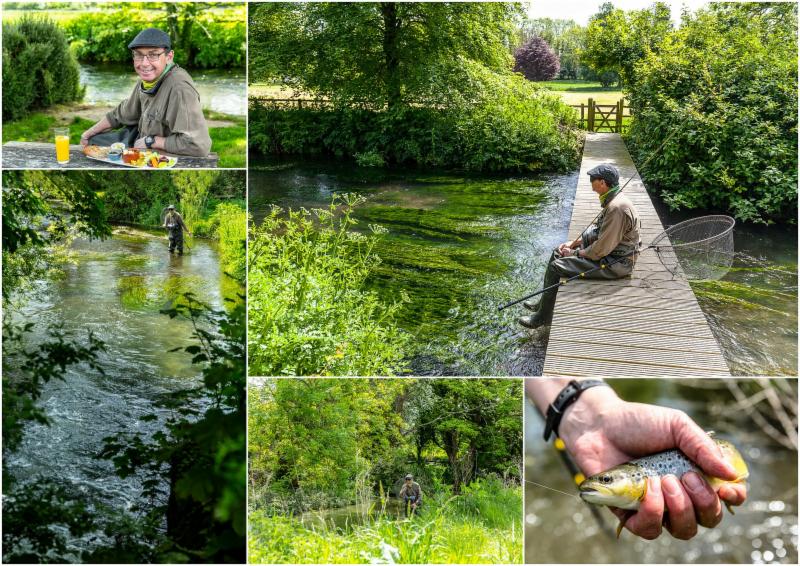
PS We didn't supply Chris's
lunch. He is in the most excellent Shoe Inn a 3 minute amble from the fishing
(sometimes a 10 minute stagger back) with its own river garden. One of
Hampshire's best country pubs. Check it out.
Let it rain,
let it rain ..... not necessarily
Fair to say
it has been a confusing winter with records broken for dry, wet, hot and cold
..... and that's even before we hark back to the summer heatwave. So, if you
haven't been in sight of a chalkstream since last season you might be in slight
trepidation as to what to expect.
Well, the truth is rather
dull - despite all the huge monthly variations we are in a highly average
annual cycle. The Environment Agency (EA) measure rainfall against what they
call the Long Term Average (LTA) that being the average annual rainfall in the
years 1961-1990. The southern chalkstreams straddle the two of the regions, the
south east and south west that the EA compile data for. So, averaging those two
out the LTA for the past three months stands at 90%, last six months 94.5% and
the last year 97%.
Translated into what you'll
actually see most chalkstreams are currently at Normal flow rates or slightly
better. The only ones that could do with a bit more rain are those in Berkshire
and Norfolk, plus the limestone rivers of Derbyshire but nothing critical.
So when you do venture out I
think, all in all, you'll find them looking good.
The Quiz
More
questions to hopefully entertain and enlighten. As ever it is just for fun with
the answers at the bottom of the Newsletter.

1) Today is the Ides of March.
What is the meaning if the word ides?
2) March 15th 1952
is recorded as the wettest day in history. How many inches of rain fell on
Reunion Island in the Indian Ocean over the 24 hour period? Clue: the UK annual
average is 33 inches.
3) Who died on this day in 44
BC?
Have a good weekend.
Best wishes,
Simon Cooper simon@fishingbreaks.co.uk
Founder & Managing Director
Answers:
1)
In the ancient
Roman calendar a day falling roughly in the middle of each month
2)
73 inches
3)
Julius Caesar
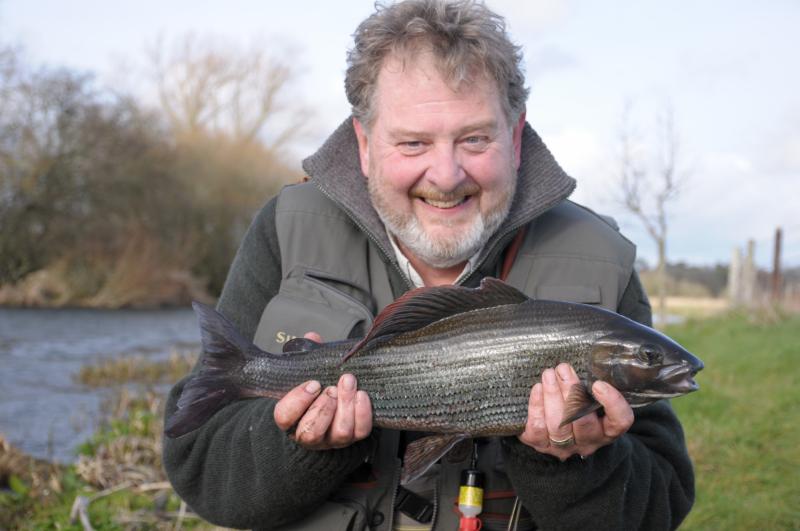

No comments:
Post a Comment